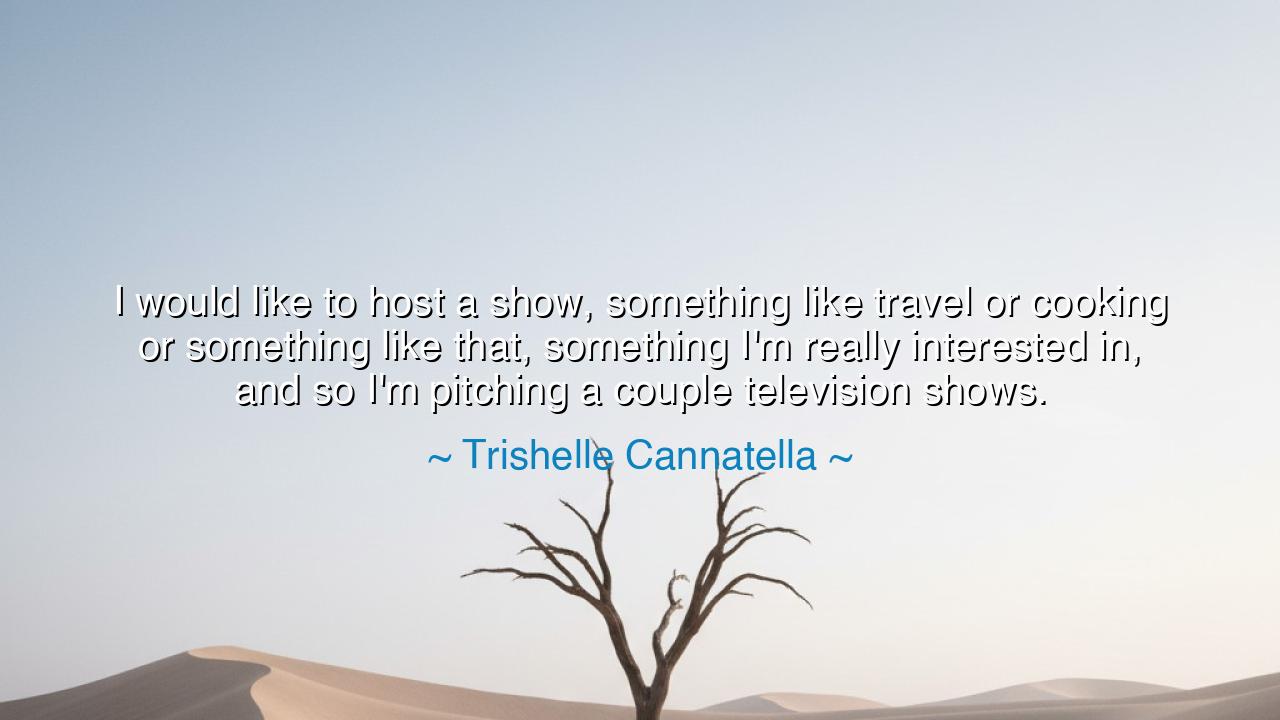
I would like to host a show, something like travel or cooking or
I would like to host a show, something like travel or cooking or something like that, something I'm really interested in, and so I'm pitching a couple television shows.






Trishelle Cannatella once proclaimed with earnestness and vision: “I would like to host a show, something like travel or cooking or something like that, something I'm really interested in, and so I'm pitching a couple television shows.” Though spoken in the tongue of modern ambition, this declaration carries an ancient resonance, for it speaks of the eternal human desire to unite passion with purpose, to turn the flame of personal interest into a torch that might enlighten and entertain others.
When she speaks of hosting a show, Cannatella touches the timeless role of the storyteller. In ages past, men and women gathered around fires, listening to bards recount tales of distant lands or feasts prepared in sacred ritual. The stage, the screen, the modern broadcast—these are but new forms of the same ancient circle, where one voice carries the attention of the many. To host is not merely to perform, but to guide, to invite others into an experience of discovery.
Her mention of travel carries the spirit of exploration, the longing to step beyond one’s dwelling and to gather wisdom from faraway lands. To bring such journeys before an audience is to become a bridge between worlds, to allow those who remain at home to taste of cultures, landscapes, and lives beyond their reach. In the same way, the medieval explorers returned from Asia or Africa bearing not only goods but stories, enriching their people with visions of the greater world.
So too, her mention of cooking recalls the sacred art of nourishment, not only of the body but of the soul. To prepare food and to share it has ever been a sign of community and celebration. From the feasts of Homeric heroes to the humble loaves and fishes of sacred texts, cooking has always been storytelling through flavor, a way to carry history, memory, and meaning into the present moment. A show of cooking is no mere spectacle, but a continuation of humanity’s most ancient ritual.
Her act of pitching television shows is itself an act of courage. For to pitch is to step forward with a dream in one’s hands, knowing that it may be accepted or rejected. The ancients, too, knew this trial: inventors presented their devices to kings, poets recited before patrons, philosophers taught in open squares, uncertain if any would heed them. The pitching of a dream is a declaration of faith—that one’s passion is worthy of the world’s attention.
History provides us a tale in the figure of Marco Polo. When he returned from his long travels, he pitched his stories to his countrymen, who at first doubted him, mocking his “book of marvels.” Yet his persistence brought forth a text that inspired generations of explorers. So it is with Cannatella’s words: the dream may begin small, fragile, uncertain, but if pursued with faith, it may ripple across time and space, shaping lives far beyond one’s own.
The lesson is clear, O seeker: do not hide your passions, but proclaim them. Whether it be travel, cooking, art, music, or any other pursuit, dare to bring your interests into the world with courage. Many will doubt, some will refuse, but it is better to pitch and risk rejection than to let the flame burn unseen. Life rewards those who unite their craft with their heart.
Therefore, let this teaching be engraved upon your soul: “Something I’m really interested in”—these are the words of power. Build your life not upon duties alone, but upon that which awakens your joy. For when passion becomes offering, the world is nourished, and you yourself walk the path of fulfillment.






AAdministratorAdministrator
Welcome, honored guests. Please leave a comment, we will respond soon